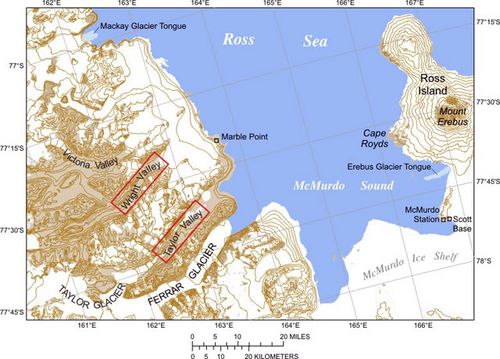My first Monday in McMurdo started early. I was up at 5:30am and off to breakfast by 6:00am. We had our team meeting at 7:30am. My main responsibilities today were to complete some additional training and try to catch-up on my journals. The training this morning was about the environment in Antarctica and in particular about an area known as the McMurdo Dry Valleys. This area contains a row of valleys that contain many interesting geological features including Onyx River, the longest river in Antarctica. The McMurdo Dry Valleys also contain the largest region of ice-free ground in Antarctica. Approximately 30% of the ground in this region is free of snow and ice. The area includes glaciers, mountain ranges, ice-covered lakes, meltwater streams, permafrost, sand dunes, and interconnected watershed systems.
The unique conditions in the Dry Valleys are caused by katabatic winds which occur when cold, dense air is pulled downhill by the force of gravity. These winds can be extremely devastating, reaching speeds of up to 200 mph.
In June 2004, the Dry Valleys were one of the first areas to be designated as an ASMA (Antarctic Specially Managed Area). This means that the Dry Valleys must be treated in a certain manner to maintain their amazing features.
The following is a map of the McMurdo Dry Valleys.
 This map from the USGS shows the various sites located in the McMurdo Dry Valleys. This area has been designated an ASMA.
This map from the USGS shows the various sites located in the McMurdo Dry Valleys. This area has been designated an ASMA.
For additional information and several other detailed maps got to http://www.mcmurdodryvalleys.aq/.
It is a truly amazing place with amazing sights, sounds, and experiences. In fact, two of the PolarTREC teachers will be participating in research in the McMurdo Dry Valleys.
Robin Ellwood from New Hampshire is working with Dr. Peter Doran from the University of Illinois at Chicago. She will be working as part of the McMurdo Dry Valleys Long-term Ecological Research (LTER) project. Robin is a SCUBA diver and she will be collecting data from the lakes of the Dry Valleys. For more information about Robin's project and to follow her adventures go to http://www.polartrec.com/lake-ecosystems-in-antarctica.
The other PolarTREC teacher that will be working in the McMurdo Dry Valleys is Jackie Hams from California. She will be working with Dr. Dave Marchant from Boston University. Jackie and the research team will be using a special drill to study ice deposits that are found in Beacon Valley and estimated to be millions of years old. This research will provide information that will help us understand the history of Mars (now that's out of sight!). If you would like to follow Jackie and her team, then go to http://www.polartrec.com/ancient-buried-ice-in-antarctica.
Well, I better go work on my journals. I wouldn't want you all to miss any of the excitement. Tomorrow I go to "Happy Camper" training and I can't wait.

